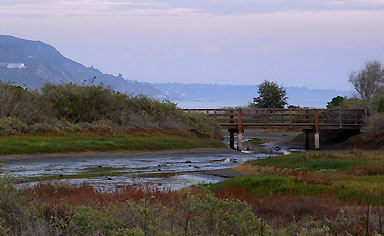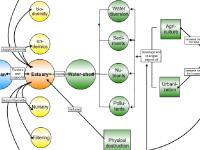| |
|
|
How do Humans Affect Estuaries? Click on the image to enlarge.
Click here to access this map in
CLIMB. |
Dr. Peggy Fong's research focuses on how humans affect the sustainability and health of marine coastal
communities. While some of her field research takes her great distances, she also works in local
California estuaries and coastal lagoons, on projects designed to assess how excess nutrients from
terrestrial systems are affecting the health of downstream coastal estuaries.
Understanding the ecological functioning of estuaries is vital. They play key roles in the support of high
biodiversity, in biogeochemical cycling, and are arguably the most threatened marine ecosystems in the world.
California estuaries are also important stopovers for seabirds along the Pacific Flyway. Their continual
degradation is of great concern to conservation efforts.
"We're getting transitions from a healthy natural state to a degraded state." |
"We're putting a lot of nutrients into these systems, and have documented that there have been several phase
shifts," says Peggy, "from ones that are dominated by seagrasses to systems that are dominated by
macroalgae, or Harmful Algal Blooms (HABs)." Seagrasses - which are more closely related to your lawn than
most other things in the ocean - require high amounts of light and oxygen, both of which are reduced as
more nutrients are added to the ecosystem. The research that Peggy has been doing in her lab for over
20 years is focused on trying to figure out "how much is too much".



